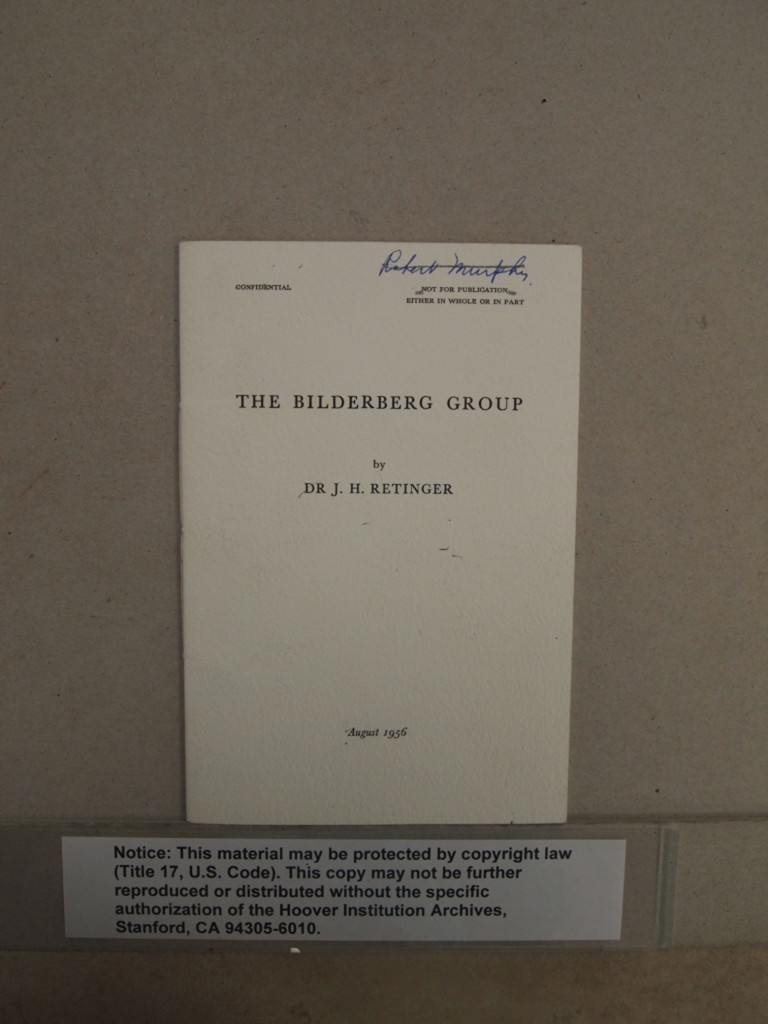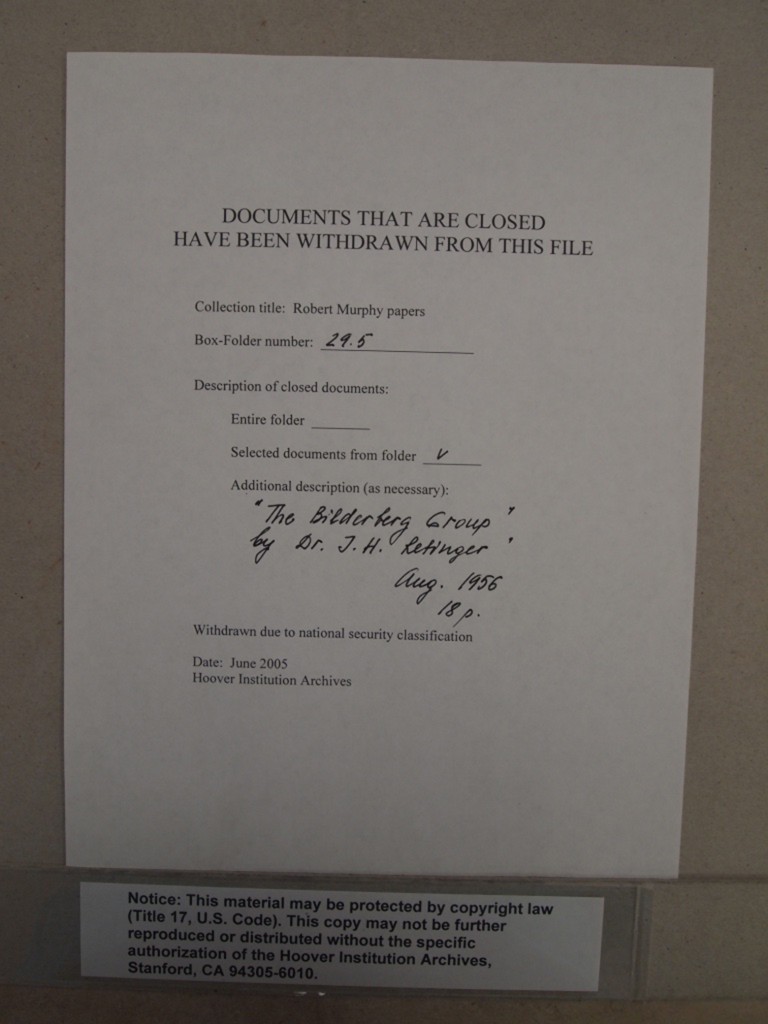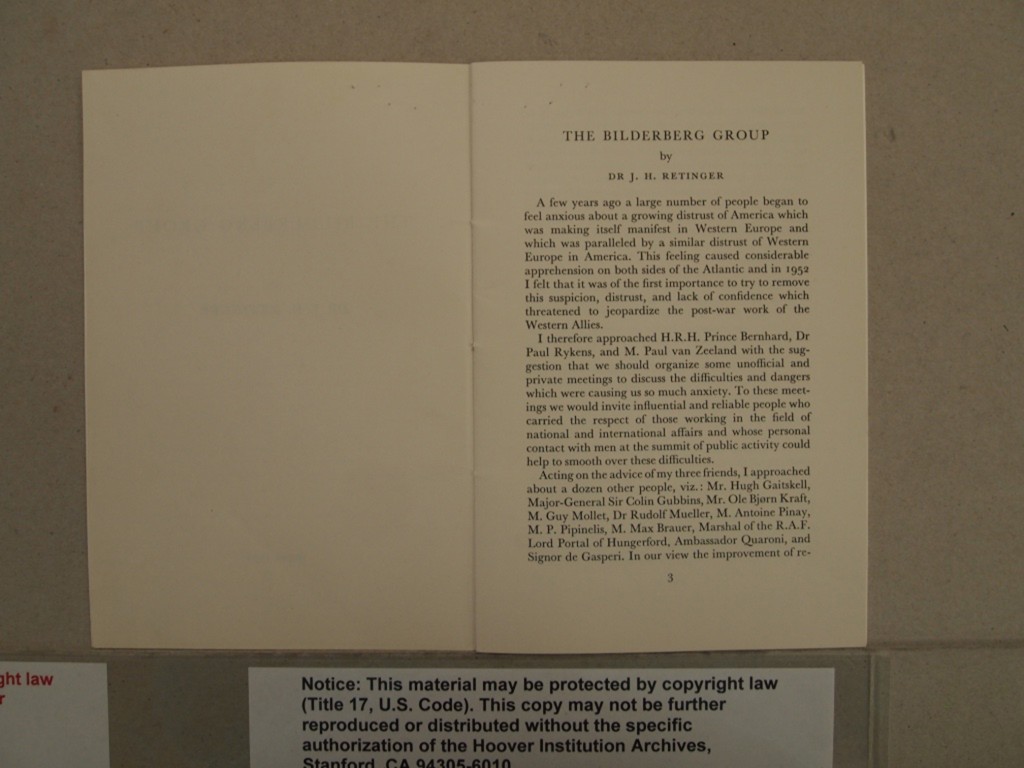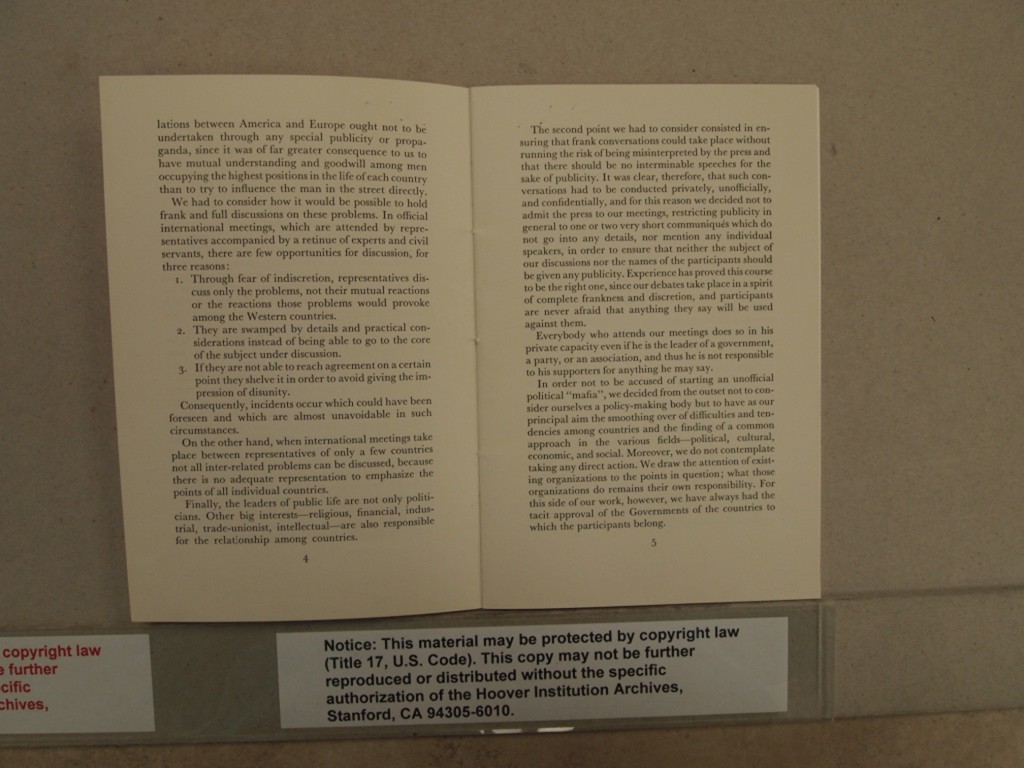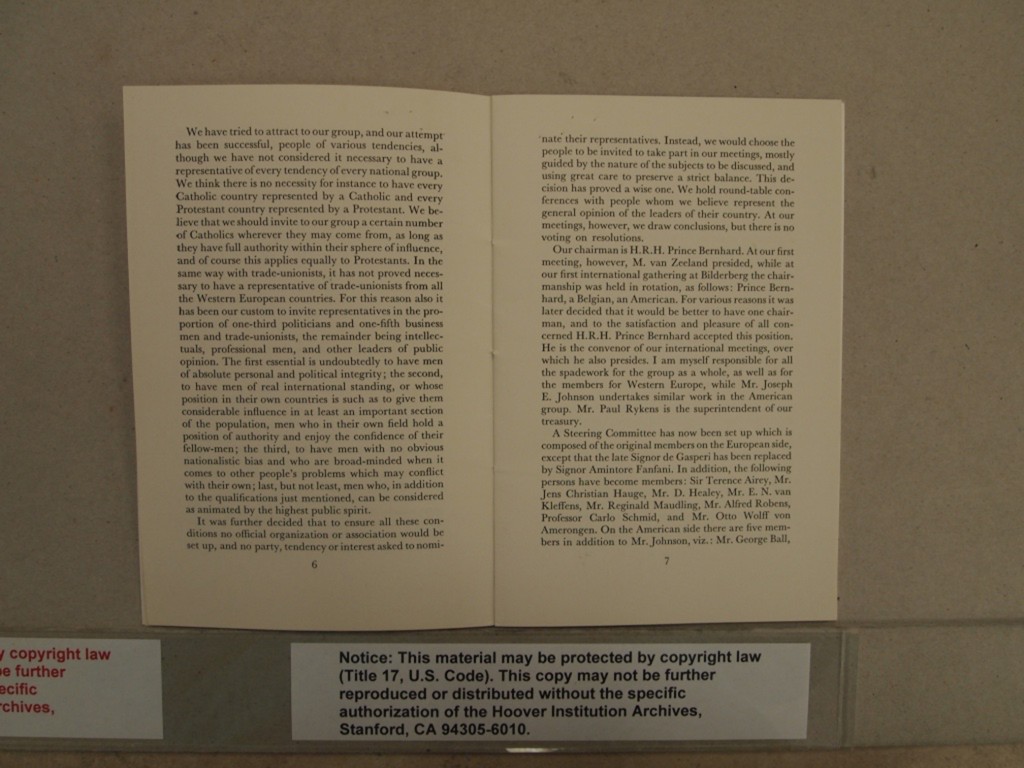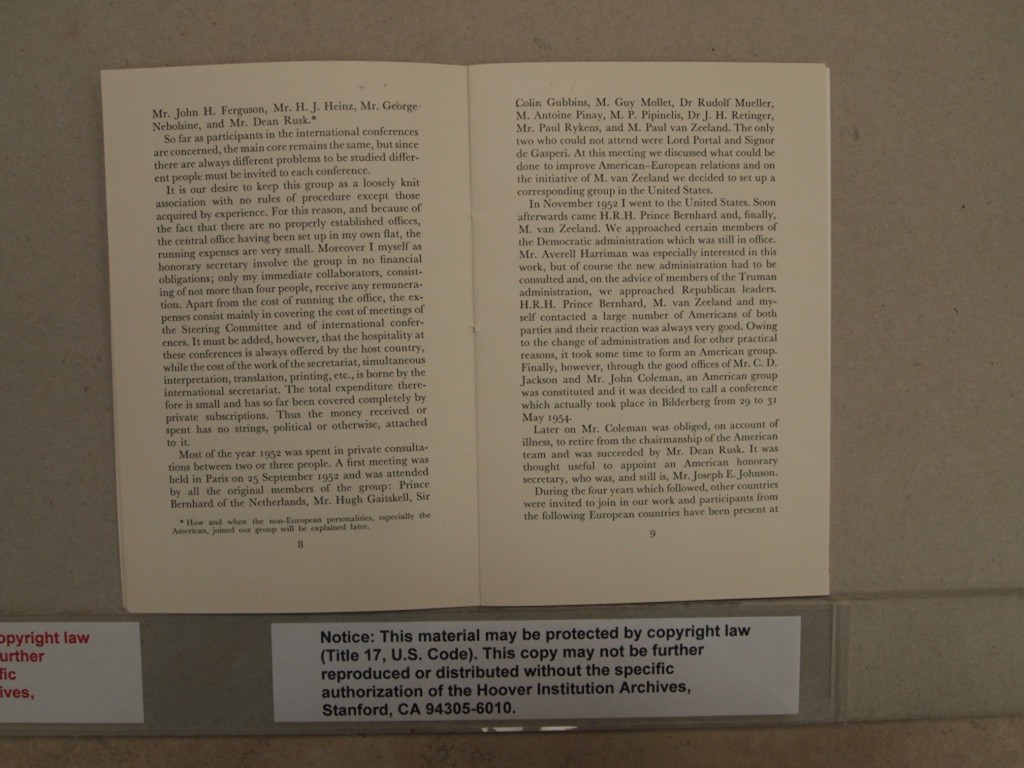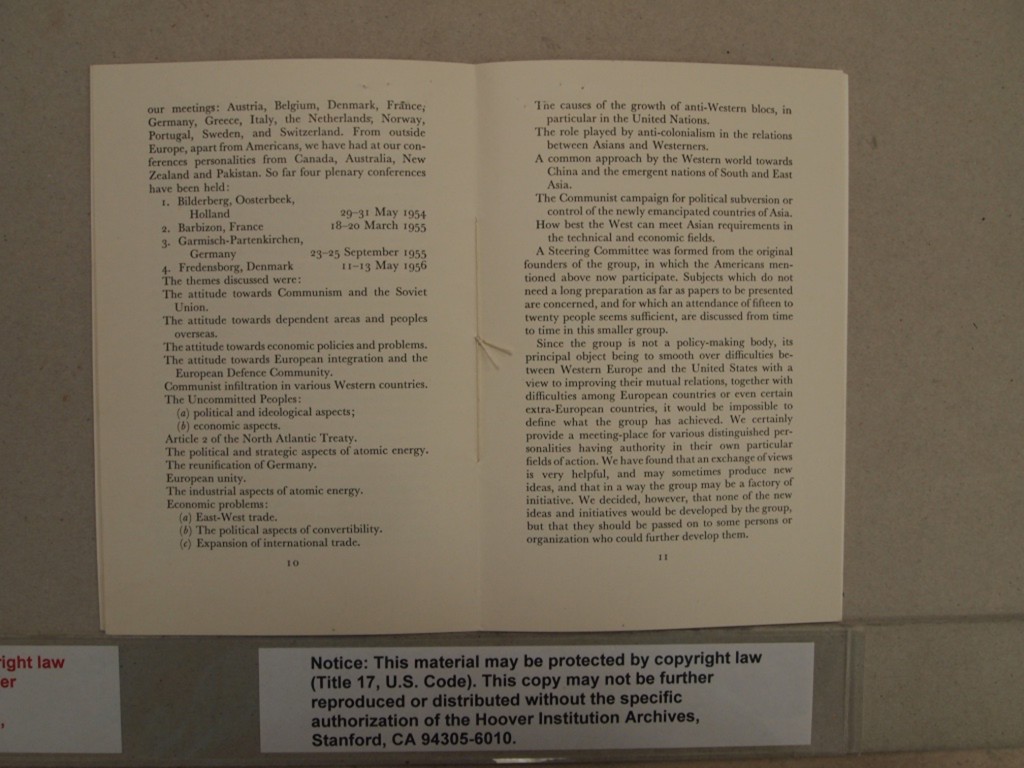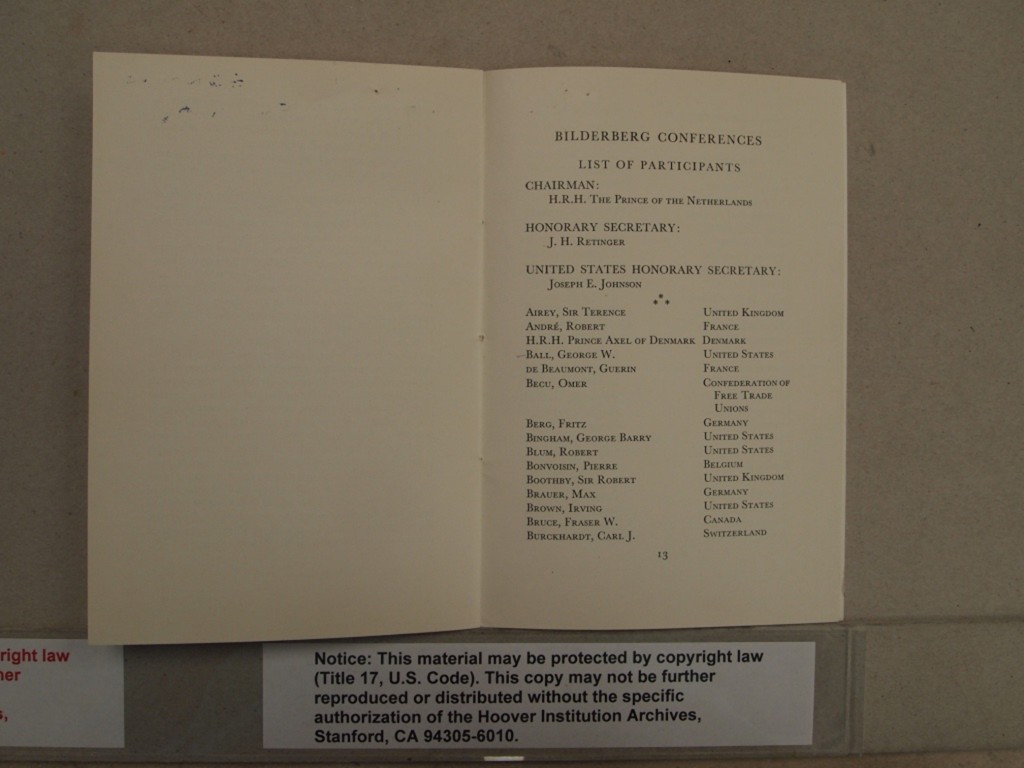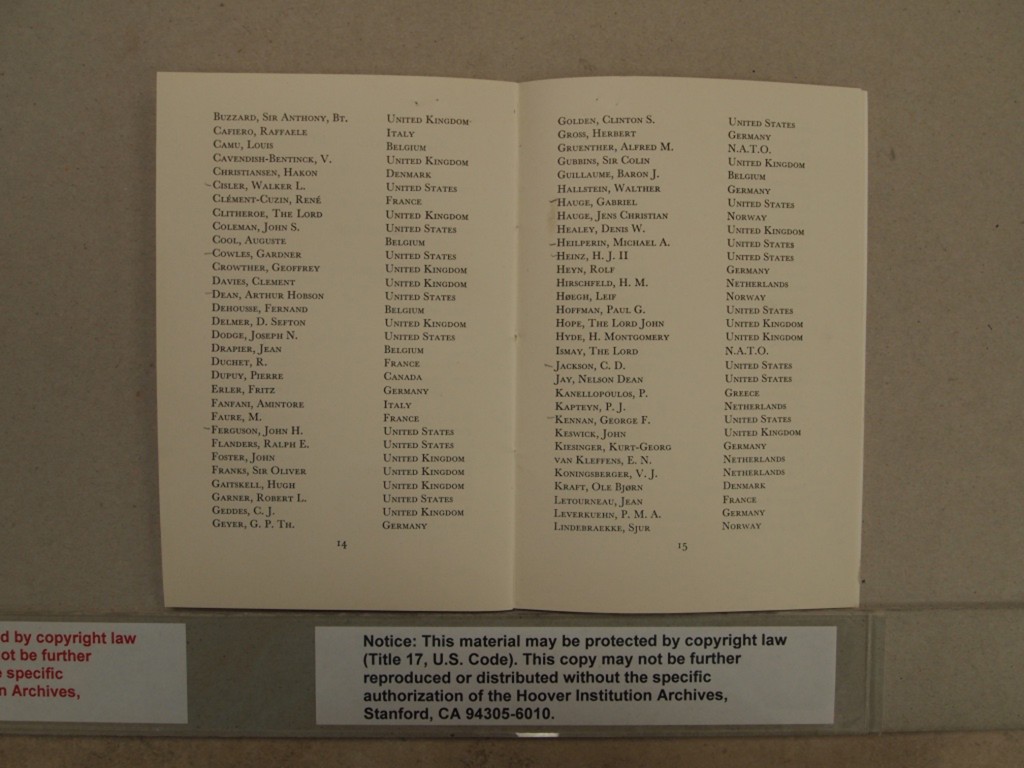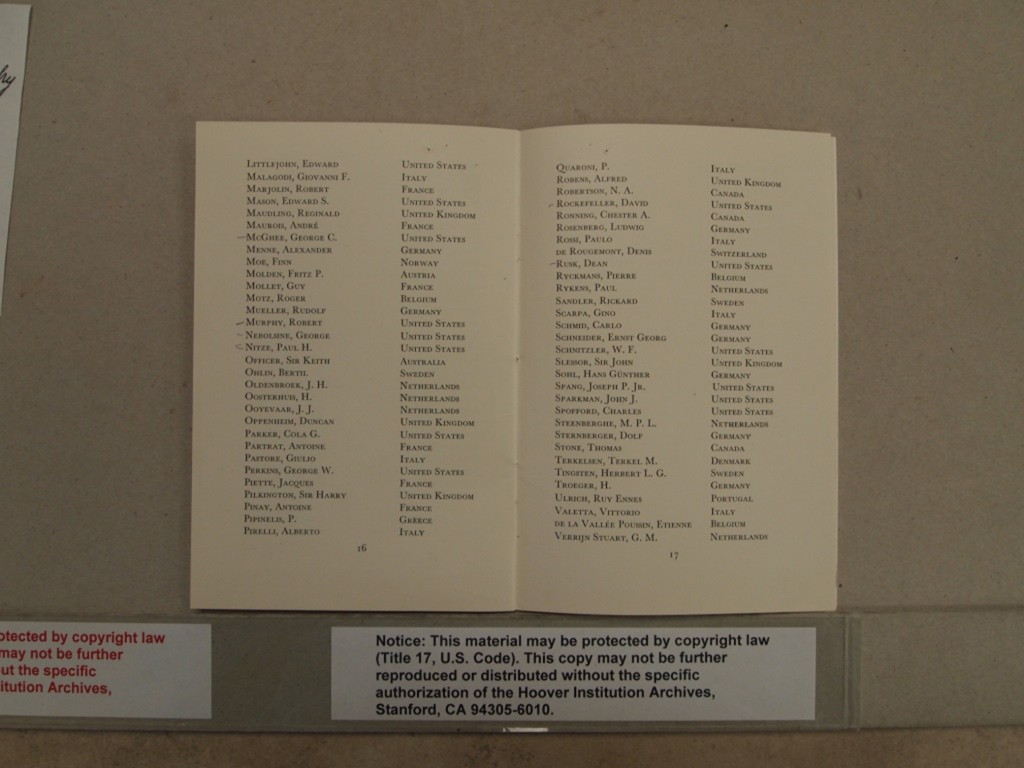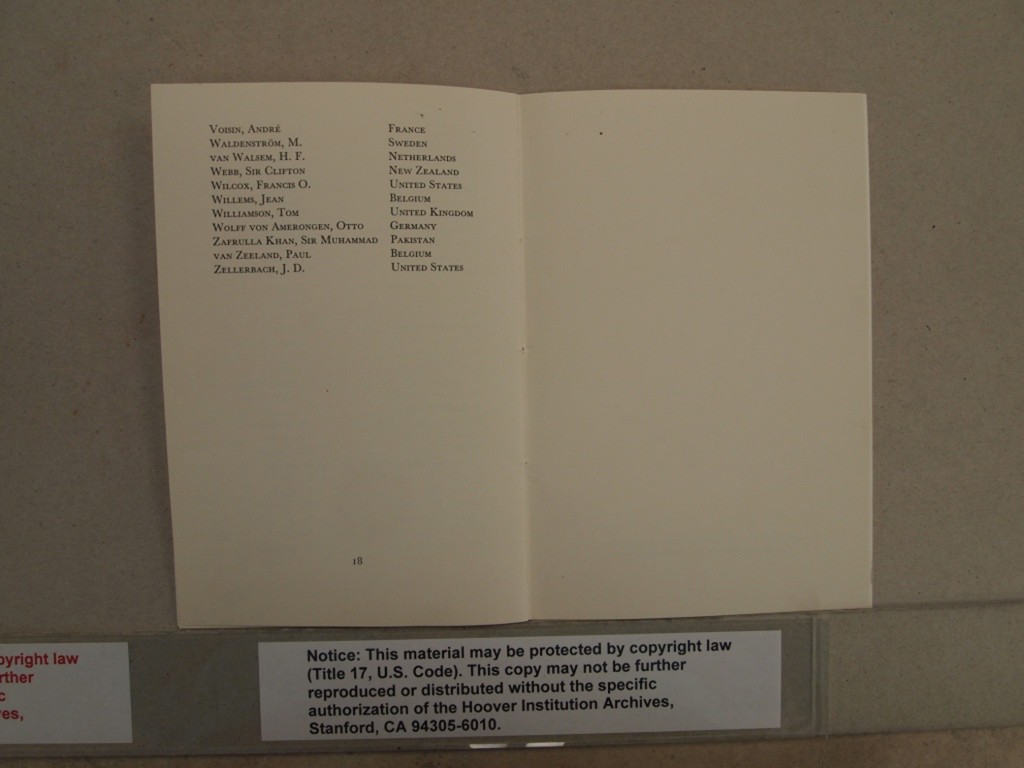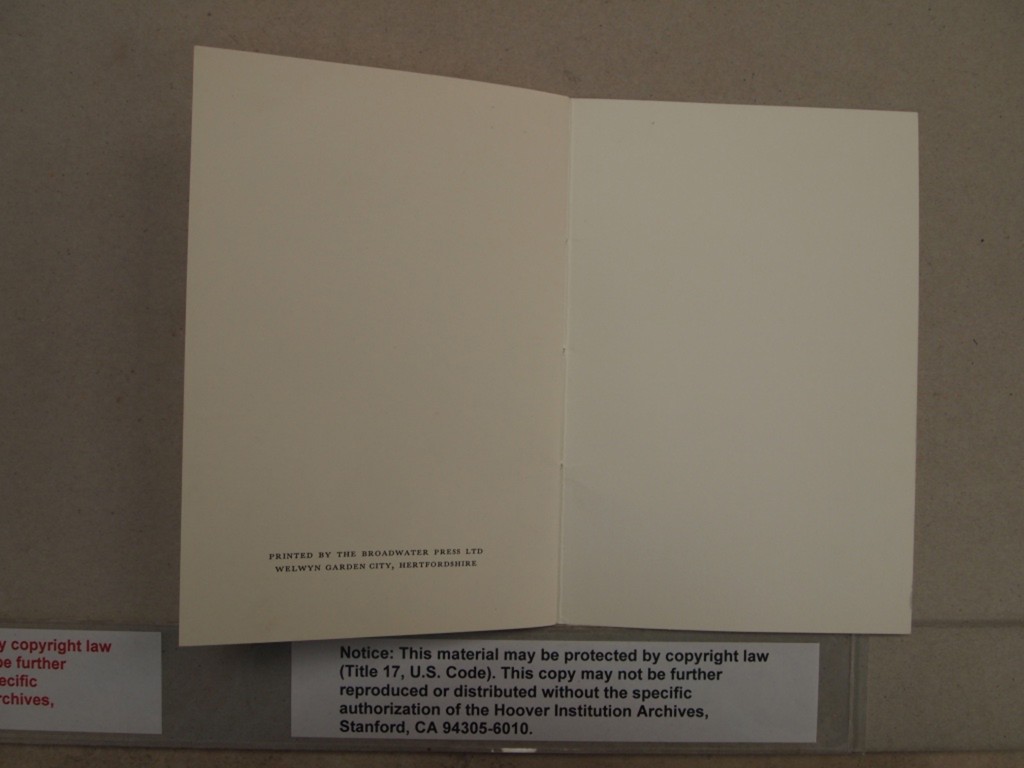A few years ago a large number of people began to feel anxious about a growing distrust of America which was making itself manifest in Western Europe and which was paralleled by a similar distrust of Western Europe in America. This feeling caused considerable apprehension on both sides of the Atlantic and in 1952 I felt that it was of the first importance to try to remove this suspicion, distrust, and lack of confidence which threatened to jeopardize the post-war work of the Western Allies.
I therefore approached H.R.H. Prince Bernhard, Dr Paul Rykens, and M. Paul van Zeeland with the suggestion that we should organize some unofficial and private meetings to discuss the difficulties and dangers which were causing us so much anxiety. To these meetings we would invite influential and reliable people who carried the respect of those working in the field of national and international affairs and whose personal contact with men at the summit of public activity could help to smooth over these difficulties.
Acting on the advice of my three friends, I approached about a dozen other people, viz.: Mr. Hugh Gaitskell, Major-General Sir Colin Gubbins, Mr. Ole Bjorn Kraft, M. Guy Mollet, Dr Rudolf Mueller, M. Antoine Pinay, M. P. Pipinelis, M. Max Brauer, Marshal of the R.A.F. Lord Portal of Hungerford, Ambassador Quaroni, and Signor de Gasperi. In our view the improvement of relations between America and Europe ought not to be undertaken through any special publicity or propaganda, since it was of far greater consequence to us to have mutual understanding and goodwill among men occupying the highest positions in the life of each country than to try to influence the man in the street directly.
We had to consider how it would be possible to hold frank and full discussions on these problems. In official international meetings, which are attended by representatives accompanied by a retinue of experts and civil servants, there are few opportunities for discussion, for three reasons:
1. Through fear of indiscretion, representatives discuss only the problems, not their mutual reactions or the reactions those problems would provoke among the Western countries.
2. They are swamped by details and practical considerations instead of being able to go to the core of the subject under discussion.
3. If they are not able to reach agreement on a certain point they shelve it in order to avoid giving the impression of disunity.
Consequently, incidents occur which could have been foreseen and which are almost unavoidable in such circumstances.
On the other hand, when international meetings take place between representatives of only a few countries not all inter-related problems can be discussed, because there is no adequate representation to emphasize the points of all individual countries.
Finally, the leaders of public life are not only politicians. Other big interests—religious, financial, industrial, trade-unionist, intellectual—are also responsible for the relationship among countries.
The second point we had to consider consisted in ensuring that frank conversations could take place without running the risk of being misinterpreted by the press and that there should be no interminable speeches for the sake of publicity. It was clear, therefore, that such conversations had to be conducted privately, unofficially, and confidentially, and for this reason we decided not to admit the press to our meetings, restricting publicity in general to one or two very short communiques which do not go into any details, nor mention any individual speakers, in order to ensure that neither the subject of our discussions nor the names of the participants should be given any publicity. Experience has proved this course to be the right one, since our debates take place in a spirit of complete frankness and discretion, and participants are never afraid that anything they say will be used against them.
Everybody who attends our meetings does so in his private capacity even if he is the leader of a government, a party, or an association, and thus he is not responsible to his supporters for any thing he may say.
In order not to be accused of starting an unofficial political “mafia”, we decided from the outset not to consider ourselves a policy-making body but to have as our principal aim the smoothing over of difficulties and tendencies among countries and the finding of a common approach in the various fields—political, cultural, economic, and social. Moreover, we do not contemplate taking any direct action. We draw the attention of existing organizations to the points in question; what those organizations do remains their own responsibility. For this side of our work, however, we have always had the tacit approval of the Governments of the countries to which the participants belong.
We have tried to attract to our group, and our attempt has been successful, people of various tendencies, although we have not considered it necessary to have a representative of every tendency of every national group. We think there is no necessity for instance to have every Catholic country represented by a Catholic and every Protestant country represented by a Protestant. We believe that we should invite to our group a certain number of Catholics wherever they may come from, as long as they have full authority within their sphere of influence, and of course this applies equally to Protestants. In the same way with trade-unionists, it has not proved necessary to have a representative of trade-unionists from all the Western European countries. For this reason also it has been our custom to invite representatives in the proportion of one-third politicians and one-fifth business, men and trade-unionists, the remainder being intellectuals, professional men, and other leaders of public opinion. The first essential is undoubtedly to have men of absolute personal and political integrity; the second, to have men of real international standing, or whose position in their own countries is such as to give them considerable influence in at least an important section of the population, men who in their own field hold a position of authority and enjoy the confidence of their fellow-men; the third, to have men with no obvious nationalistic bias and who are broad-minded when it comes to other people’s problems which may conflict with their own; last, but not least, men who, in addition to the qualifications just mentioned, can be considered as animated by the highest public spirit.
It was further decided that to ensure all these conditions no official organization or association would be set up, and no party, tendency or interest asked to nominate their representatives. Instead, we would choose the people to be invited to take part in our meetings, mostly guided by the nature of the subjects to be discussed, and using great care to preserve a strict balance. This decision has proved a wise one. We hold round-table conferences with people whom we believe represent the general opinion of the leaders of their country. At our meetings, however, we draw conclusions, but there is no voting on resolutions.
Our chairman is H.R.H. Prince Bernhard. At our first meeting, however, M. van Zeeland presided, while at our first international gathering at Bilderberg the chairmanship was held in rotation, as follows: Prince Bern-hard, a Belgian, an American. For various reasons it was later decided that it would be better
to have one chairman, and to the satisfaction and pleasure of all concerned H.R.H. Prince Bernhard accepted this position. He is the convenor of our international meetings, over which he also presides. I am myself responsible for all the spadework for the group as a whole, as well as for the members for Western Europe, while Mr. Joseph E. Johnson undertakes similar work in the American group. Mr. Paul Rykens is the superintendent of our treasury.
A Steering Committee has now been set up which is composed of the original members on the European side, except that the late Signor de Gasperi has been replaced by Signor Amintore Fanfani. In addition, the following persons have become members: Sir Terence Airey, Mr. Jens Christian Hauge, Mr. D. Healey, Mr. E. N. van Kleffens, Mr. Reginald Maudling, Mr. Alfred Robens, Professor Carlo Schmid, and Mr. Otto Wolff von Amerongen. On the American side there are five members in addition to Mr. Johnson, viz.: Mr. George Ball, Mr. John H. Ferguson, Mr. H. J. Heinz, Mr. George Nebolsine, and Mr. Dean Rusk.*
So far as participants in the international conferences are concerned, the main core remains the same, but since there are always different problems to be studied different people must be invited to each conference.
It is our desire to keep this group as a loosely knit association with no rules of procedure except those acquired by experience. For this reason, and because of the fact that there are no properly established offices, the central office having been set up in my own flat, the running expenses are very small. Moreover I myself as honorary secretary involve the group in no financial obligations; only my immediate collaborators, consisting of not more than four people, receive any remuneration. Apart from the cost of running the office, the expenses consist mainly in covering the cost of meetings of the Steering Committee and of international conferences. It must be added, however, that the hospitality at these conferences is always offered by the host country, while the cost of the work of the secretariat, simultaneous interpretation, translation, printing, etc., is borne by the international secretariat. The total expenditure therefore is small and has so far been covered completely by private subscriptions. Thus the money received or spent has no strings, political or otherwise, attached to it.
Most of the year 1952 was spent in private consultations between two or three people. A first meeting was held in Paris on 25 September 1952 and was attended by all the original members of the group: Prince Bernhard of the Netherlands, Mr. Hugh Gaitskell, Sir Colin Gubbins, M. Guy Mollet, Dr Rudolf Mueller, M. Antoine Pinay, M. P. Pipinelis, Dr J. H. Retinger, Mr. Paul Rykens, and M. Paul van Zeeland. The only two who could not attend were Lord Portal and Signor de Gasperi. At this meeting we discussed what could be done to improve American-European relations and on the initiative of M. van Zeeland we decided to set up a corresponding group in the United States.
In November 1952 I went to the United States. Soon afterwards came H.R.H. Prince Bernhard and, finally, M. van Zeeland. We approached certain members of the Democratic administration which was still in office. Mr. Averell Harriman was especially interested in this work, but of course the new administration had to be consulted and, on the advice of members of the Truman administration, we approached Republican leaders. H.R.H. Prince Bernhard, M. van Zeel and and myself contacted a large number of Americans of both parties and their reaction was always very good. Owing to the change of administration and for other practical reasons, it took some time to form an American group. Finally, however, through the good offices of Mr. C. D. Jackson and Mr. John Coleman, an American group was constituted and it was decided to call a conference which actually took place in Bilderberg from 29 to 31 May 1954.
Later on Mr. Coleman was obliged, on account of illness, to retire from the chairmanship of the American team and was succeeded by Mr. Dean Rusk. It was thought useful to appoint an American honorary secretary, who was, and still is, Mr. Joseph E. Johnson.
During the four years which followed, other countries were invited to join in our work and participants from the following European countries have been present at our meetings: Austria, Belgium, Denmark, France, Germany, Greece, Italy, the Netherlands, Norway, Portugal, Sweden, and Switzerland. From outside Europe, apart from Americans, we have had at our conferences personalities from Canada, Australia, New Zealand and Pakistan. So far four plenary conferences have been held:
1. Bilderberg, Oosterbeek, Holland 29-31 May 1954
2. Barbizon, France 18-20 March 1955
3. Garmisch-Partenkirchen, Germany 23-25 September 1955
4. Fredensborg, Denmark 11-13 May 1956
The themes discussed were:
The attitude towards Communism and the Soviet Union.
The attitude towards dependent areas and peoples overseas.
The attitude towards economic policies and problems.
The attitude towards European integration and the European Defence Community.
Communist infiltration in various Western countries.
The Uncommitted Peoples:
(a) political and ideological aspects;
(b) economic aspects.
Article 2 of the North Atlantic Treaty.
The political and strategic aspects of atomic energy.
The reunification of Germany.
European unity.
The industrial aspects of atomic energy.
Economic problems:
(a) East-West trade.
(b) The political aspects of convertibility.
(c) Expansion of international trade.
The causes of the growth of anti-Western blocs, in particular in the United Nations.
The role played by anti-colonialism in the relations between Asians and Westerners.
A common approach by the Western world towards China and the emergent nations of South and East Asia.
The Communist campaign for political subversion or control of the newly emancipated countries of Asia.
How best the West can meet Asian requirements in the technical and economic fields.
A Steering Committee was formed from the original founders of the group, in which the Americans mentioned above now participate. Subjects which do not need a long preparation as far as papers to be presented are concerned, and for which an attendance of fifteen to twenty people seems sufficient, are discussed from time to time in this smaller group.
Since the group is not a policy-making body, its principal object being to smooth over difficulties between Western Europe and the United States with a view to improving their mutual relations, together with difficulties among European countries or even certain extra-European countries, it would be impossible to define what the group has achieved. We certainly provide a meeting-place for various distinguished personalities having authority in their own particular fields of action. We have found that an exchange of views is very helpful, and may sometimes produce new ideas, and that in a way the group may be a factory of initiative. We decided, however, that none of the new ideas and initiatives would be developed by the group, but that they should be passed on to some persons or organization who could further develop them.

